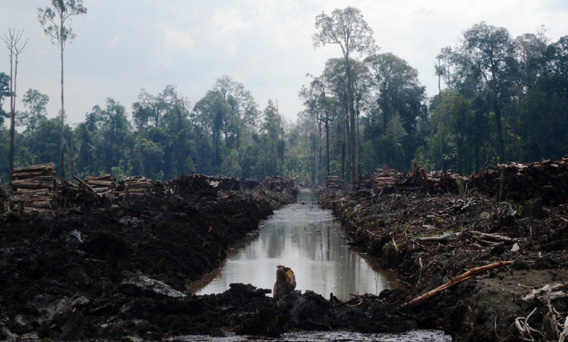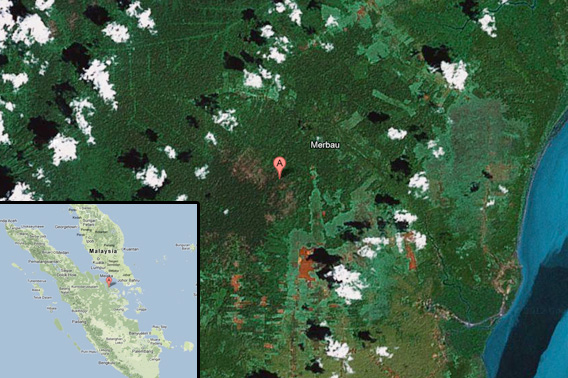Beleaguered forestry giant Asia Pulp & Paper (APP) is overstating the conservation significance of its recently announced moratorium on forest conversion on the islands of Sumatra and Borneo, argues a new report issued by an Indonesian activist group.
The report [PDF], published Monday by Greenomics, says that the nearly 200,000 hectares of “natural forest” APP says it won’t covert to industrial plantations consists mostly of “scrubland, agriculture land or land affected by conflicts with local communities”.
“The use of the phrase ‘suspension of natural forest clearance’ [by APP] is inappropriate,” states the report, which says that only 204 hectares of the 198,941 hectares APP says is now off-limits from development is actually forest in a contiguous block.
By law, APP cannot develop plantations on land where there are conflicting claims from local communities, according to Greenomics.
The environmental group goes on to report that based in these findings, the Ministry of Forestry has asked APP to revise its “Sustainability Roadmap” to reflect the reality that its moratorium doesn’t really suspend clearing of nearly 200,000 ha of natural forest.
The Greenomics report is not entirely negative, however. It notes that for a change, APP does not try to claim extra credit for preserving forest in legally mandated protected areas.
“APP always claimed in the past that such protection areas had been deliberately set aside as part of its commitment to protecting natural forest in its concession areas, despite the fact that APP was already obliged by law to do so.”
Greenomics says that in an assessment provided to the Ministry of Forestry APP and its suppliers “acknowledged that they had conducted forest clearance in protection areas within their concessions.” The environmental group concludes that APP should now be required to compensate for the protection areas that have been cleared.
Greenomics’ findings are consistent with those published by Eyes on the Forest, a coalition of Indonesian NGOs, in July.
“Our analysis found there is no natural forest left to apply their new policies to in Riau Province, since all natural forest in their ‘own’ concessions had either already been cleared or protected under Indonesian law or APP showcase commitments which are also mostly nothing more than confirmation that the company would obey the law,” said Muslim Rasyid, coordinator of Eyes on the Forest member Jikalahari, in a statement. “We believe that APP’s new policies offer no conservation benefit for any forest outside Riau either.”

 Drainage canals cut into deep peat to clear tropical forest contiguous with SMG/APP’s self-declared “Senepis Tiger Sanctuary”. Photo taken by Eyes on the Forest on 18 May 2012. Caption from SMG/APP: The Pulping Continues. Lower image is a Google Earth maps showing the location of the photo.
Drainage canals cut into deep peat to clear tropical forest contiguous with SMG/APP’s self-declared “Senepis Tiger Sanctuary”. Photo taken by Eyes on the Forest on 18 May 2012. Caption from SMG/APP: The Pulping Continues. Lower image is a Google Earth maps showing the location of the photo.
APP announced its “Sustainability Roadmap” in May 2012 as part of its effort to phase out sourcing of fiber from natural forests by 2015. The target applies only to APP-owned forest concessions, although suppliers are expected to conduct HCVF assessments on their holdings by the same year.
The initiatives are a response to criticism from environmental groups over APP’s forest management practices. According to groups ranging from WWF to the Rainforest Alliance to Greenpeace, APP has converted vast areas of tropical forest and peatlands for acacia and eucalyptus plantations to feed its pulp mills. WWF estimates that APP and its suppliers have destroyed 2 million hectares of forest in Sumatra since 1984, including critical habitat for endangered tigers, elephants, orangutans, and rhinos. Conversion has also driven substantial greenhouse gas emissions. By one estimate, carbon dioxide emissions from the Indonesian pulp and paper industry amount to 600 million tons per year, or more than the total emissions from deforestation in the Brazilian Amazon.
Complaints from environmental groups have hit APP hard. Greenpeace’s campaign has been particularly damaging, costing APP dozens of major customers — including Xerox, Kraft, National Geographic, Mattel, and Carrefour, among others — in recent years. WWF has also issued a series of reports showing that APP has failed to abide by three past targets for phasing out natural forest logging and that the paper giant’s “conservation initiatives” are little more that compliance with Indonesian law. One of these prior commitments was to conserve HCVF as specified under the Rainforest Alliance’s SmartWood program. APP breached that pledge in 2005 and 2006, leading Rainforest Alliance to terminate the agreement with APP in 2007. The Forest Stewardship Council (FSC) subsequently ended its relationship with APP.
Given this checkered record, the environmental community’s response to APP’s initiative has been fairly tepid. However some are hopeful that this time might be different for APP. One of these is The Forest Trust, a group that works with companies to improve the environmental performance of their supply chains. Last month, The Forest Trust (TFT) revealed to mongabay.com that it is working with APP to implement and monitor a new sustainability program for the paper giant.
TFT’s involvement is noteworthy as it has produced success elsewhere. In 2011 it helped Golden Agri Resources (GAR), Indonesia’s largest palm oil company and under the same ownership as APP, establish a forest conservation policy that excludes conversion of land that has more than 35 tons of carbon (effectively peatlands and rainforests) and requires free, prior, and informed consent (FPIC) in dealing with local communities. The measures immediately moved GAR — which had been the target of a brutally effective Greenpeace campaign — to the forefront of environmental policy among Indonesian palm oil companies. Independent analysis suggests that GAR is so far abiding by the policy, which may already be paying dividends for the company. Whereas two years ago, GAR was suffering from sustained customer defections, earlier this month there was sufficient good will or market optimism for GAR to raise $400 million via a bond offering.
Whether TFT can do the same with APP remains to be seen, but APP insists it is turning over a new leaf.
“To help bring positive change on the ground we are working closely in both Indonesia and China with The Forest Trust (TFT), which is providing advice, guidance, capacity building and monitoring on issues around High Conservation Value forests, High Carbon Stock forests, peat land clearance, community conflict and other operational issues affecting environmental and social performance,” APP told mongabay.com. “We will continue to keep stakeholders and the wider NGO community updated on our progress and welcome further input.”
CITATION: Greenomics. Why the Indonesian Ministry of Forestry Recommends that ASIA PULP & PAPER revise its “APP Sustainability Roadmap 2020 and beyond (October 2012).